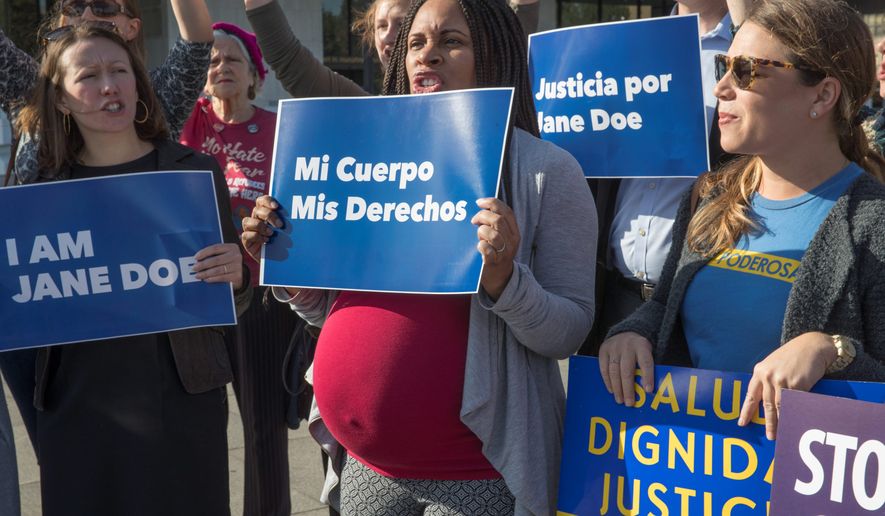Immigrants living in the U.S. illegally have rights to obtain abortions and the government must facilitate the exercise of that right, including making pregnant minors in custody aware of the option, an appeals court found Friday.
The court did, though, order a new review of whether the government can disclose a migrant child’s abortion to her parents.
Overall the ruling was a striking victory for immigrant-rights and pro-choice activists, saying the right to abortion extends to everyone in the U.S., including those who entered without permission and who are still legally children.
The case dealt with Unaccompanied Alien Children (UAC), juvenile immigrants who arrived at the border without a parent. Under the law, they are to be quickly processed and sent to health officials, who keep them in dorms while searching for sponsors to take them in.
Some of the girls arrive pregnant and have sought abortions, only to run into hurdles from the Trump administration, which tried to counsel them against the procedure and declined to facilitate the abortion, saying it ran afoul of a prohibition on spending taxpayer money.
The U.S. Circuit Court of Appeals for the District of Columbia broadly rejected that stance.
“Under binding Supreme Court precedent, a person has a constitutional right to terminate her pregnancy before fetal viability, and the government cannot unduly burden her decision,” the court said in a lengthy unsigned opinion.
Legal analysts said the court’s ruling assumed the right to abortion, but never confronted it squarely. They said there’s room to challenge it in the future.
The Trump administration didn’t argue that point, instead saying that even if immigrant children have the right to abortion, the government can impose restrictions such as making an abortion-seeker wait.
In this case, the government said it should be allowed time to find a sponsor before being forced to facilitate the abortion. The administration said a child, particularly one who had been through the trauma of the journey to the border, would benefit from the guidance of such a sponsor.
The administration argued that if the child wanted an unfettered right to an abortion, she could agree to be deported, thus freeing her from the restrictions of U.S. law and policy.
The court, in its 2-1 decision, rejected that.
“It is difficult to imagine the government arguing, say, that unaccompanied minors should be denied the right to freely worship while in [government] custody because those denied religious liberty in their native countries might otherwise be enticed to come to the United States,” the court ruled.
“And correspondingly, we cannot accept the suggestion that minors in [government] custody should be compelled to carry pregnancies to term against their wishes — even in cases of rape — so that others will be deterred from desiring to come here,” the judges said.
Under the court ruling, the government must inform every pregnant migrant child in government custody that abortion is an option — including teens who had never asked, nor support that option.
That didn’t sit well with Judge Laurence Silberman, who dissented.
He questioned whether the case was still ripe — all of the teens who were named in the original lawsuit have long since had abortions or been discharged from government custody — and he said to force pro-life teens to be told about abortion could actually infringe on their own freedom of association rights.
Judge Silberman said the government should at least be given a chance to find a sponsor. He said, though, that the search must end and the government facilitate the abortion should the pregnancy near viability.
The Trump administration and allies such as Texas Attorney General Ken Paxton warned of “abortion tourism,” saying the ruling creates an incentive for those in that situation to come to the U.S., particularly from countries where the right to abortion is more circumscribed.
The court, though, rejected that, arguing that some migrants are raped or otherwise impregnated on the trip here, so the tourism argument doesn’t apply to them. And even if it does invite people to make the trip, that’s not a reason to circumscribe the right, the judges in the majority concluded.
The ruling was a broad affirmation of a ruling by U.S. District Judge Tanya S. Chutkan, who had repeatedly ruled against the Trump administration.
Judge Chutkan had said she didn’t want to condemn migrant girls who fled countries where abortion was illegal from having to choose between remaining in the U.S. or being returned to those countries.
The appeals court Friday did disagree with one part of Judge Chutkan’s ruling. The circuit judges said her gag order prohibiting the government from alerting migrants’ parents or sponsors of the abortion was not yet justified.
The appeals court remanded the case for Judge Chutkan to develop that issue.
• Stephen Dinan can be reached at sdinan@washingtontimes.com.




Please read our comment policy before commenting.